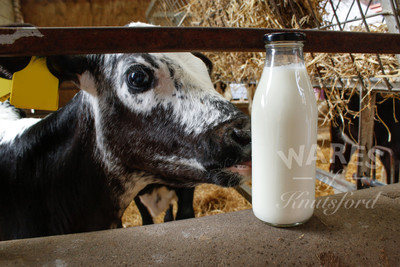What are the benefits of raw milk?
Posted by The Wares Team on 14th Jun 2023
What to know about raw milk
If you're interested in topics such as health, regenerative farming and environmentalism, you may have heard about raw milk, particularly in relation to its possible health benefits. But this type of unpasteurised milk still remains controversial and many of our customers wonder if it is something they can safely buy and use. In this blog, we'll cover everything you need to know!
What is raw milk?
Raw milk is, essentially, unpasteurised milk that has not been treated in any way to remove any harmful bacteria, or to help extend its shelf life. It is the milk that your grandparents may have been lucky enough to drink directly from the farm when they were small, with a far richer, livelier and creamier taste than processed milk.
Fans of raw milk say that it is packed with nutrients and good bacteria and that it can help to prevent allergies. The taste of raw milk is incredibly rich and delicious too. It is believed to contain more vitamins, antimicrobials, amino acids, minerals and fatty acids than processed milk. It's fair to say that raw milk fans tend to be passionate advocates for this most natural of drinks, and demand for raw milk and fermented products such as yoghurt is rocketing.
Is raw milk legal?
It is illegal for unpasteurised dairy milk to be sold on the high street across the UK, and it is outlawed in Scotland. However, small-scale and private sales of raw milk have grown nearly five-fold in the UK since 2018 [1]. In 2014, Farmer's Weekly reported sales of 610,000 litres; by 2018 this figure had grown to 3 million litres - and it is still growing. It's now very easy to buy raw milk from trusted, reputable sources. These producers offer ready and in-depth information about the products they sell and the processes they follow to make them, offering peace of mind.
Is raw milk safe?
Milk is pasteurised to remove dangerous bacteria that can cause serious illness, such as salmonella, e-coli, listeria and campylobacter. The pasteurisation process has been used to kill microorganisms in milk since the 1800s, but many people argue that it also kills the beneficial ingredients in milk. Many of the diseases associated with unpasteurised milk, such as typhoid and diphtheria, were also associated with poor farming hygiene practices. Farms that produce raw milk explain that they operate according to strict hygiene practices and modern farming that creates safer products.
Where can I buy raw milk?
In Scotland, it is illegal to sell raw milk in any way, However, in England, Northern Ireland and Wales, it can be sold directly to consumers via registered producers. Commonly, this means that raw milk is sold via vending machines or in glass bottles at the farm, via milk delivery rounds, at farmers' markets and via food delivery services. All raw milk must be clearly labelled with a standardised health warning to inform customers about the risks of the product.
How should I store raw milk?
If you are lucky enough to find a reliable provider of creamy, nutritious raw milk, then the best way to store it is in a glass bottle. Here's one of our top sellers: https://www.waresofknutsford.co.uk/bottles/glass-milk-bottles/
Farmers will often sell it in traditional milk glass bottles, and some may offer it in larger raw milk glass bottle sizes, ideal for the fridge door. A milk glass bottle is the best way to store this natural drink because it is free from chemicals, completely natural and easy to recycle. It also imparts no unwanted flavour into the milk, which can be a problem with plastic containers. Milk bottles also look lovely and there is nothing more evocative of the good life than a row of clean, sparkling milk glass bottles in a wire holder!
Should I drink raw milk?
The raw milk benefits are certainly enough to convince many of our customers, and we regularly sell glass milk bottles to customers who buy raw milk from the farm and decant it into small bottles to store in their fridge. For many people, it will be extremely tempting to enjoy a glass of this creamy drink in its most natural form, if only to experience it. If this is something that appeals to you, it's worth noting that most customers do their research carefully to find a reputable, trusted local farm. Certain groups are advised to avoid raw milk, such as pregnant women and people with compromised immune systems.
In short, drinking raw milk is entirely a personal decision, but it is wonderful to see that there is another way for localised farms and producers to build custom within their local communities, without needing to resort to centralised and industrialised food production networks at all times. Raw milk is perhaps the ultimate in heritage living, a natural product sold locally by trusted farms to customers that have a relationship with that farm. We're certainly following the raw milk trend with interest.
Resources:

